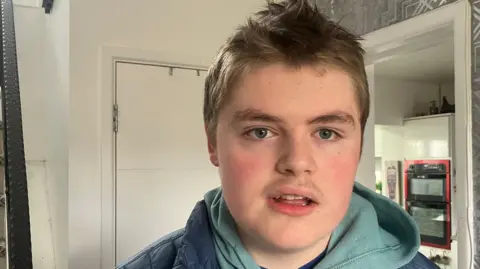Apology for autistic teen left without school for over a year
 BBC
BBCThe Education Authority (EA) has "sincerely apologised" to the family of an autistic teenager who has not been in school for a year and a half.
The EA said the "significant delay" in finding a suitable school for 14-year-old Jai Stalford was as a "result of wider system pressures".
Jai, who is non-verbal and has learning difficulties, has not been in school since October 2023.
His mother, Tracy Irwin, said the family have "felt abandoned, that's the only word for it".
In a statement to BBC News NI, the EA said there was "very limited SEN (Special Educational Needs) capacity in the face of growing demand and complexity of need which, regrettably, places major constraints on the entire education sector when placing children".
There has been a significant rise in the number of children requiring a special school place in recent years.
There has also been a shortage of EA staff in some areas to support young people with SEN.

Jai's mother, whose work as a university lecturer has been interrupted as she cares for her son, told BBC News NI about his situation.
"He has a wee communication device, but he finds it difficult to communicate and sometimes to make himself understood, but he is a happy child," said Dr Irwin.
"We're talking about a child who becomes frustrated when he can't make himself understood and because he's so big now, sometimes he can lash out."
Jai's previous special school said they could not meet his needs.
"After the half-term break in October 2023 we got a phone call from the school saying that he had become very distressed, very dysregulated and couldn't calm him down," Dr Irwin said.
"That happened for three days in a row.
"The school, in fairness, tried.
"They had some meetings with the EA, and meetings with various professionals, but they then said that they could no longer meet his needs."
'No support'
Dr Irwin said Jai subsequently had a home tutor for a short period, but since October 2023 had been at home and not in school.
"All day, every day, with no support, no educational input from anybody, aside from what we've put in place ourselves for him," she said.
She said the past year and a half had been "very difficult".
"What 14-year-old boy wants to be sitting at home?" she said.
"He wants out all the time, he wants to go out, to go out in the car, to go out and visit people.
"He misses all that social interaction that he had with the school."
Financial implication
Dr Irwin said she had not been able to work as normal "because we have had him with us all the time".
"Obviously there's financial implications there as well, there's my mental health because I haven't been able to get out and socialise and do all of the activities that I would have done before," she said.
"So it has had a major impact."
Dr Irwin had complained a number of times to the EA about Jai's situation.
BBC News NI has seen that correspondence, and the EA response, which upheld some, but not all, of the complaints.

The EA apologised for the delay in finding a suitable placement for Jai and for some elements of communication with the family.
In a statement, the EA said "an appropriate place in a special school has been identified", adding that they are "continuing to engage with the family to address any concerns they have".
However, Dr Irwin said the special school identified for Jai is in Larne, a significant distance from the family's home in Jordanstown.
"It'd be 20 miles at least and if he was even dysregulated once on the bus that would be the end of it, and we couldn't possibly take him every day up and down," said Dr Irwin.
"He wouldn't be able to consistently, day after day, make that journey."
Long-term impact
At the minute the family take Jai to a community centre every morning and do some school work with him. They have also arranged for a specialist agency to work with him.
But Dr Irwin said she worries about the long-term impact of Jai being out of school.
"He's a child who needs routine, who needs structure," she said.
"The longer he's out of school or any sort of structured environment, the harder it's going to be to get him back.
"I thought that he would be a priority - a vulnerable child who can't speak, can't talk.
"It seems incomprehensible to me that we're still sitting now with nothing in place."
An EA spokesperson told BBC News NI that it was "committed to ensuring that all children with SEN are placed in an appropriate school setting which fully meets their needs".
"Work is continuing apace to increase capacity for September 2025 and beyond.
"We are also committed to improving communications and engagement with parents/carers which is a critical priority," it continued.
"The EA has created a centralised SEN helpline, is running face-to-face drop-in centres, and have increased staffing to enhance the level of support provided to families."
